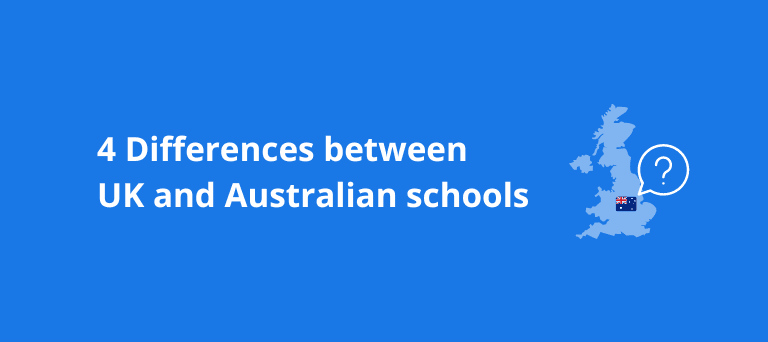Chris Clarke
20 Jul 2023
5
min read

Teaching in the UK, you say? Fish and chips, red buses, queuing & Cockney rhyming slang are all great, but how will teaching in Blighty compare?
Don't worry, we’ve got you covered. In this article, we’ll look at 4 key differences you need to know before you embark on a life-changing adventure to the other side of the world, teaching in the UK.
1. Exams and qualifications
Here in Australia, we have an array of different certificates and qualifications, depending on which state you’re in.
In the UK, the exam system is universal, so you’ll be prepping your students towards:
SATS: Primary (5-11 years old)
GCSE: Secondary (11-16 years old)
A-Levels: Further (6-18 years old)
In the UK, students must remain in education up until age 16, when they can either pursue higher education, vocational courses or just find a job in the real world.
So yeah, students in the UK will be undertaking more exams than over here, so you’ll be much more involved as they progress through the years!
2. School year and holidays
The ages of the students, year splits and amount of holidays are nearly identical.
As the UK is in the northern hemisphere, the school year lasts from September through to July.
This is split into 3 terms Sept-Dec (Autumn) Jan- Mar (Spring) and Apr -July (Summer)
Like here, they have an extended summer break, over there though, in July and August!
3. Curriculum
Like the examination process, the UK has a universal curriculum that is followed nationwide.
There isn't much difference really, you'll be teaching compulsory subjects like Mathematics, English, Science, Design and Technology, History, Geography, Art and Design, Music, Physical Education, Computing and Ancient and Modern Foreign languages.
Because the UK is a multicultural country, you’ll find Religious education is much more diverse and you'll be teaching a much broader range of topics than you would here.
Sports (PE) in the UK will be more indoors-based, though this is down to the weather more than anything else!
4. School Life
Many ex-pats have reported schools in the UK are more formal than over here.
There is a greater emphasis on standards with regulatory bodies ensuring education standards are kept, OFSTED carrying out inspections.
Whilst in the UK, you’ll become deeply involved in the school community, get to know parents, and have a much more significant investment in your students as you see them through their education. Thoroughly rewarding!
A great way to dip your toes in is with supply teaching (what I would call 'casual relief teaching' over here). But be wary – UK agencies very often take a big chunk of your pay. The best way to avoid this is with Zen Educate, an alternative to agencies who will pay you more fairly and with more transparency. With Zen, you can find great teaching jobs for Aussies in London, Manchester, Birmingham, Bristol, Leeds and more.
So there you have it!
Aside from the cultural differences, there's not much to choose between the UK and Australia.
You'll follow the thousands of ex-pats, who have already given it a shot and enjoyed the rewards of teaching on the other side of the world.
Glossary of terms you’ll find useful
SLT
Senior Leadership Team
ECT
Early Career Teacher
DSL
Designated Safeguarding Lead – responsible for children's safeguarding and welfare.
SENCo
Special Educational Needs Co-ordinator.
TA
Teaching Assistant
HT
Headteacher
QTS
Qualified Teacher Status
GCSE & A-Levels
Students at the end of their period of compulsory education sit their GCSE (General Certificate of Secondary Education) exams in Year 11 across all subjects.
The results determine in part the educational pathway a student takes in their tertiary studies.
Post GCSEs, students can stay in education and attend a Sixth Form or College for 2 years, where they will sit their A-Level (Advanced Level) exams in 3 or 4 subjects. This is the final step of schooling before university.
Ofsted
All schools in the UK are regulated and measured by the government’s school regulatory board Ofsted (Office for Standards in Education).
Ofsted Inspectors rate schools under four headings, from ‘Outstanding’ to ‘Inadequate’. A school’s effectiveness is based on the following criteria: overall effectiveness, effectiveness of leadership and management, quality of teaching, learning and assessment and outcomes for pupils.



